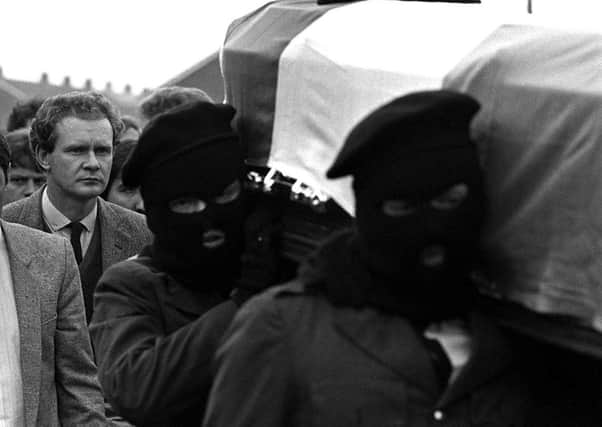Irish Government deliberately did not condemn ceasefire murders by IRA in 1996 to keep Sinn Féin on board, declassified file reveals


In rare contemporaneous written evidence of a policy widely suspected to be in place at the time, taoiseach John Bruton’s special advisor, Sean Donlon, privately told the embassy that the Irish feared such condemnation “would risk splitting Sinn Fein”.
Although the IRA was meant to be on ceasefire, it was known to the governments to be engaging in criminal activity up to and including murder, while denying that was the case.
Advertisement
Hide AdAdvertisement
Hide AdA January 3, 1996 cable from the British Embassy in Dublin to the Foreign Office in London, said: “[The] Irish Government fear that condemnation by them of recent killings in Northern Ireland would risk splitting Sinn Fein.
“They intend to make their views known privately to [Gerry] Adams.”
The restricted cable, which has been declassified at the Public Record Office in Belfast under the 20-year rule, is unsigned, but such communications typically were sent by the British Ambassador or another senior diplomat.
The cable went on: “Sean Donlon (Taoiseach’s special advisor) told me on 3 January that the Irish Government were gloomy about events in the North.
Advertisement
Hide AdAdvertisement
Hide Ad“They feared that if they were to condemn publicly the recent drug-related killings in Northern Ireland (which they firmly believed was the work of the IRA) this would run the risk of splitting Sinn Fein.
“Instead, the Taoiseach would send O hUiginn and Teahon [senior Irish officials] to speak to Adams privately in the next few days. Donlon said that the Taoiseach had felt extremely let down by the recent killings. He had accepted (and repeated publicly) Adams’ word that the IRA would not resort to violence.
“For this reason, for the time being, Mr Bruton did not wish to see Adams personally.
“He might do so late, if his officials made any progress. Meanwhile he accepted that Adams was finding it hard to control his extremists.”
Advertisement
Hide AdAdvertisement
Hide AdThe cable added: “Since taking the decision not to release nine IRA prisoners on 21 December, the Irish Government has passed little comment on the drug related killings in Northern Ireland ... the paucity of official comment has been in contrast to the extensive condemnation of the killings throughout the Irish media and by politicians in Northern Ireland.
“Donlon’s explanation confirms speculation that the Irish Government wanted to avoid antagonising Sinn Fein at what is perceived here as a particularly sensitive time.”
Among the hundreds of other files which have been declassified there is a note from just over a year later from civil servant Diane McNally in the NIO’s political development team which shows that by then the Irish government were attempting to publicly play down loyalist violence.
The January 21, 1997 memo summarised developments at The Northern Ireland Forum for Political Dialogue talks which involved both elected representatives of the Northern Ireland parties and senior diplomats from the British and Irish governments.
Advertisement
Hide AdAdvertisement
Hide AdIt said: “The British side handed over the text of a statement (subsequently published) indicating concern at recent attacks attributed to loyalists, and acknowledging that they raised questions over the position of the loyalist parties in the talks.
“The Irish were unhappy at the British side raising the profile of the issue: (there were hints that elements in Dublin fear us to be seeking the expulsion of the loyalists, paving the way for the exclusion of Sinn Fein).”
SF Irish language priority was puzzling to Dublin
A confidential note of a “friendly, relaxed and enjoyable” dinner at Maryfield where the Irish Joint Secretariat hosted the Department of Education’s permanent secretary recorded that the civil servant was told the Irish language was one of two key issues consistently being raised by Sinn Fein.
A declassified November 26, 1997 note of the evening said that Irish Joint Secretary David Donoghue “said that in all recent contacts with Sinn Fein two issues were uppermost; viz matters affecting prisoners and treatment of the Irish language.
Advertisement
Hide AdAdvertisement
Hide Ad“The Irish side understood why Sinn Fein should be seeking movement on prisoners (tangible evidence of concessions in return for their involvement in the talks process) but the reason for the importance of the latter was less obvious. Sinn Fein took the view that recognition of the Irish language would be seen as validating nationalism.
“The Irish side did not want to denigrate what had already been done in this field (there was even grudging acceptance of this by Sinn Fein) but there was a need for the right ‘resonance’ to be struck in the nationalist community.”
FROM THE DECLASSIFEID FILES:
Advertisement
Hide AdAdvertisement
Hide AdAdvertisement
Hide AdAdvertisement
Hide Ad——— ———
A message from the Editor:
Thank you for reading this story on our website. While I have your attention, I also have an important request to make of you.
Advertisement
Hide AdAdvertisement
Hide AdWith the coronavirus lockdown having a major impact on many of our advertisers — and consequently the revenue we receive — we are more reliant than ever on you taking out a digital subscription.
Subscribe to newsletter.co.uk and enjoy unlimited access to the best Northern Ireland and UK news and information online and on our app. With a digital subscription, you can read more than 5 articles, see fewer ads, enjoy faster load times, and get access to exclusive newsletters and content. Visit https://www.newsletter.co.uk/subscriptions now to sign up.
Our journalism costs money and we rely on advertising, print and digital revenues to help to support them. By supporting us, we are able to support you in providing trusted, fact-checked content for this website.
Alistair Bushe
Editor